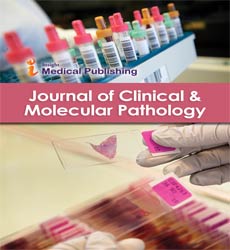ISSN : 2634-7806
Journal of Clinical and Molecular Pathology : Open Access
Host genetic Regulation of Infectious Diseases .
Namir Bol*
Department of Pathology University of Medical Sciences and Technology Khartoum, Sudan
- *Corresponding Author:
- Namir Bol
Department of Pathology University of Medical Sciences and Technology Khartoum, Sudan
Tel: 399800047185
E-mail:namir77bol@hotmail.com
Received Date: July 26, 2021; Accepted Date: October 7, 2021; Published Date: October 18, 2021
Citation: Bol N (2021) Host genetic Regulation of Infectious Diseases, J Clin Mol Pathol Vol: 5 No: 4
Editorial
Infectious disease remains as a leading cause of the mortality worldwide and includes a wide range of ailments that are caused by a pathogen, typically say virus, fungus, bacterium, or any parasite, entering and living in the host body. For many decades particularly after the revolution of molecular biology brought into about by the advent of the recombinant DNA and its techniques in the 1970s, the tenet for an infectious disease biologist identified the genes on the microbe that might play a key role in the pathogenic traits of that particular organism. By first cloning that the gene, mutating it in a defined way, identifying and measuring or analyzing the altered phenotype or the function of the mutant strain then the restoration of the gene function to re-establish the pathogenicity and also to satisfy the Koch’s postulates, and it was assumed this would lead particularly to a complete understanding of the disease. Koch’s postulates however imply that the virulence traits reside solely in the microbe and are therefore independent of the host.
Despite the awareness, it was still as technically and ethically considered challenging to understand the reasons of how, what and which the human genetic variants could merely impact the disease outcomes. Cell biology offered one means to investigate and understand how the microbes exploit a normal host cell mechanisms for their own end whereas this by no means provides the insight into the multi-tissue or the whole-organism processes necessary to understand the particular disease in a multicellular host expressing the complex layers and interacting the components of an immune system. Indeed, such an early approaches highlighted genetic complexity of the immune system and the responses to the several infectious diseases and non-infectious diseases. As the study of infectious disease is by a definition complex, sophisticated experimental investigation is considered important to allow gaining an understanding that can or may improves our human health. Model infection systems in the animals therefore offer a critical means to explore and assess the combined effect of the the plethora of pathogen–host interactions that cumulatively determine the outcome of an infection. These systems not only allows to gain the mechanistic insights into the processes or methods that initiate and progress the disease but can also provide an invaluable means to develop and assess the novel therapeutics..
Recent work on the inheritance of the susceptibility to the malaria suggests that, over what may have been a relatively short evolutionary period, a remarkably diverse series of the particular gene families have been modified in the response to the selective drive of this single infection. The phenotype consequences are not yet confined to particularly the red cell, but involve the immune system, cytokines and several other systems. It seems likely that the mechanisms of the variation in genetic susceptibility to other infective agents will reflect at least a similar degree of the complexity and, if the selective pressures have been present for the longer periods of our evolutionary history, may be even the more diverse. This may have important implications for the work directed at trying to define the susceptibility loci for current infectious and non-infectious diseases.
Open Access Journals
- Aquaculture & Veterinary Science
- Chemistry & Chemical Sciences
- Clinical Sciences
- Engineering
- General Science
- Genetics & Molecular Biology
- Health Care & Nursing
- Immunology & Microbiology
- Materials Science
- Mathematics & Physics
- Medical Sciences
- Neurology & Psychiatry
- Oncology & Cancer Science
- Pharmaceutical Sciences
